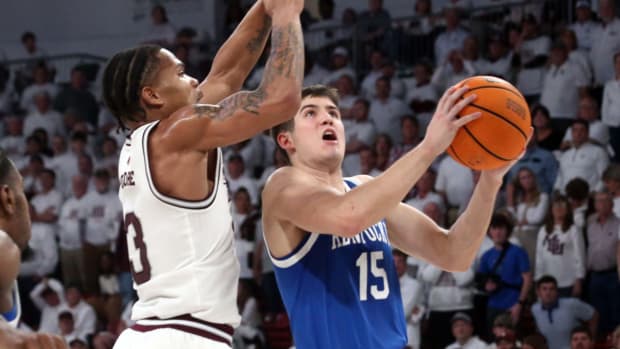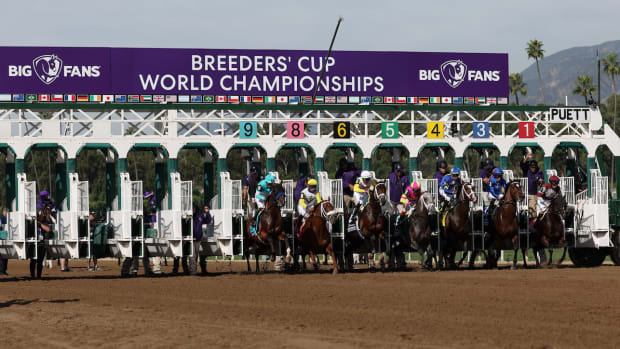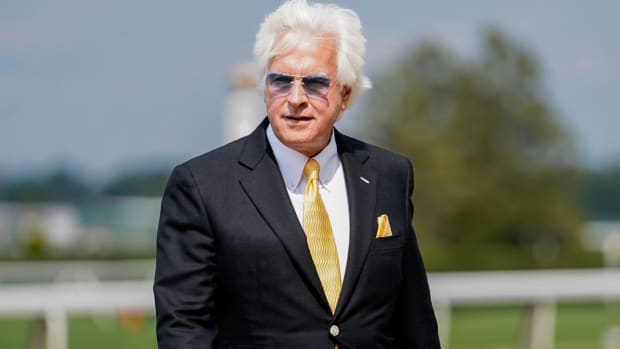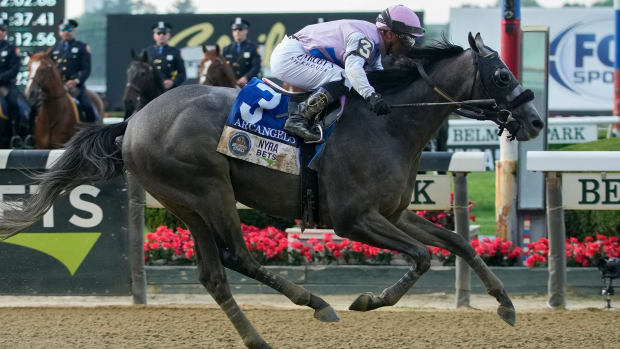Omaha Beach Could Make Kentucky Derby Dreams Come True for Richard Mandella
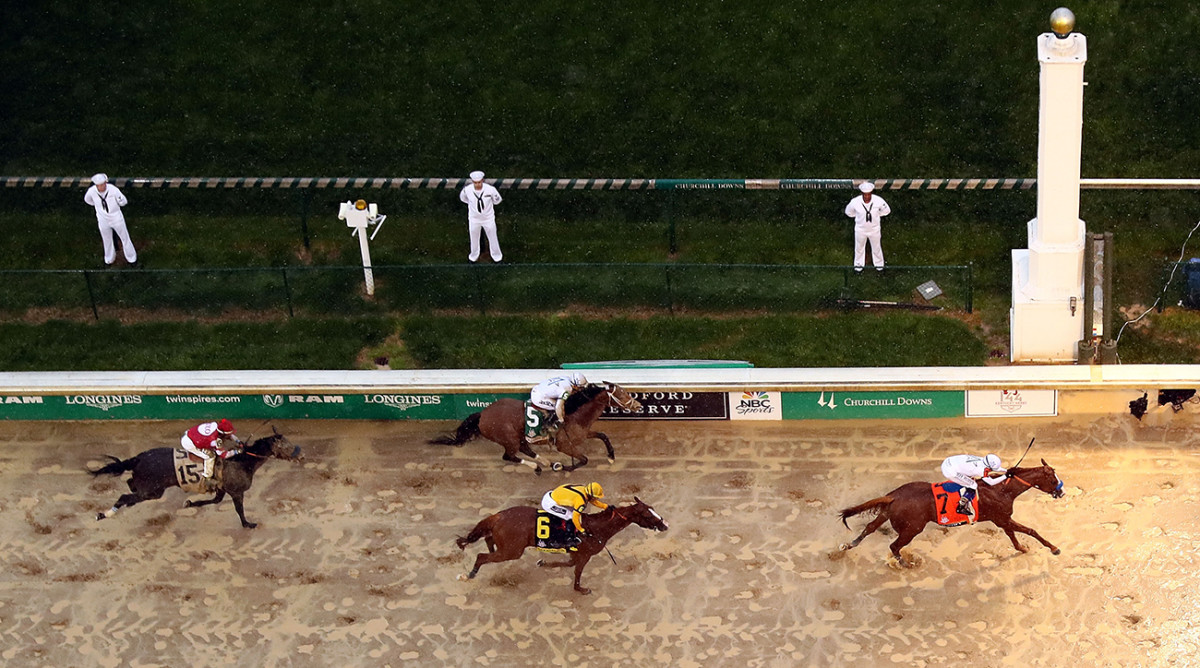
At some point in the last 15 years, thoroughbred horse trainer Richard Mandella settled on his approach for discussing the gaping hole in his resume where a Kentucky Derby victory might otherwise reside. He decided to make light of this fact, a very on-brand position for a man with a bone-dry sense of humor and preternaturally mature responses to an unforgiving game. Don’t cry, laugh. But don’t laugh too loudly.
“It’s not like I haven’t been chasing the Derby. It’s just that the Derby won’t let me catch it.”
In the two decades from 1984–2004, Mandella started six horses in the Derby. His best finish was with Soul of the Matter, who got the sloppy track he loved but nevertheless wound up fifth behind Go For Gin. His last appearance was in 2004, when Action This Day, the previous year’s Breeders Cup Juvenile champion, finished sixth at 43-1 odds, and Minister Eric came in 16th. A decade and a half has passed, during which Mandella has continually proven himself one of the best trainers in this sport, but he had not gotten a three-year-old to Churchill Downs on the first Saturday in May.
“That’s the sentence they gave me. Fifteen years and then we’ll let you come back.’’
There’s a whisper of honesty and a scream of silliness in all of this. Trainers lust after a Derby like golfers want a green jacket. Mandella keeps his desire on the safe side of desperation. On a mid-April morning, I found the 68-year-old Mandella trackside at Santa Anita Race Track in Southern California, his home base for more than four decades. His bald head was covered in a dapper twill cap, his hands in his pockets. Horses thundered past in morning workouts, filling their lungs and then exhaling, kicking up clods of dirt. Mandella offered a straighter truth about his ambition: “I’ve wanted to win the Derby since I was this big,” he says, holding his hand at thigh level. “But I’ve never had to do it. I’ve taken the horses as they come.”
His Derby sentence has been commuted. Mandella is back in the race this year, with a dark bay colt named Omaha Beach, named by his owner, Rick Porter, for the Normandy beach of the same name, one of the principal landing points of the D-Day invasion 75 years ago. (Porter has named other horses for principal World War II battles; one of them, Battle of Midway, was among the 23 horses who died at Santa Anita this winter, although Porter was no longer the owner). Omaha Beach is the winner of the Rebel Stakes and Arkansas Derby, a fast, competitive and experienced colt who could be the favorite in the Kentucky Derby on Saturday, among a group of at least half a dozen solid contenders. He is the kind of horse that makes a trainer smell roses, no matter how long it’s been. “You can hear it in his voice on the phone,” says Mandell’s son and assistant, Gary, 47. “It’s been a while, and he’s really happy to be there, with a big chance.”
In Derby lore, there are just rewards for owners, trainers and jockeys who serve their sport. In reality, there are no guarantees. Mandella was inducted into the Hall of Fame 18 years ago. In 2003 he won four Breeders Cup races in one day, a record. He trained the filly, Beholder, to Breeders Cup titles in three different years and she is regarded as one of the best racehorses in recent history. Mandella is a titan. None of this means that he is owed a Derby. But few would appreciate it more.
Mandella was born in Altadena, Calif., just a few miles from Santa Anita, but moved shortly afterward to nearby LaPuente, and from there, at age nine to Beaumont, Calif., 60 miles east, near Palm Springs. Mandella’s father, Gene, was a blacksmith and horseman of a certain unglamorous, workaday type. Gary Mandella remembers that his grandfather was short, but powerful, with the mighty hands common to his trade. Their family lived on a ranch with horses and a small training track. Richard Mandella was riding from a young age, with the goal of becoming a jockey. When he outgrew that dream he shifted seamlessly to training. He never considered another arena in which to conduct his life. “This is the only thing I wanted to do,” he says.
“My father woke up as a child and the horses were right there, on the property,” says Gary Mandella. “I’m not sure it’s possible to accurately convey to people on the outside what sort of an impression that leaves on you. Horses were a part of the family. They were your horses. My father has had a vision of working with horses since he was 13 years old. That is his life’s passion.”
It’s an undersold truth that racing people love horses (especially in this era of heightened safety awareness), but even in this realm, Mandella is an affectionate handler. Before this year’s Rebel at Oaklawn Park in Hot Springs, Ark., a video of Mandella stroking Omaha Beach in the paddock went viral. Long before that, in the 1980s, Mandella trained a sprinter named Phone Trick. As he walked Phone Trick to train or race, says Gary Mandella, his father would stroke Phone Trick’s tail. “And if he stopped stroking,” says Gary. “Phone Trick would stop walking. People talk about horse whisperers; I think it’s more important to listen to horses than to talk to them. My father listens.’’ Many trainers love their horses; Mandella shows it visibly.
Through the 1990s and 2000s, Mandella maintained a stable of 65 horses, ranging from two-year-olds to older handicap horses; when he turned 60, he dialed his barn back to 40 horses. His horses have won more than 60 major stakes and nine Breeders Cup titles, and a total of more than $140 million in purses. It’s appropriate that when legendary trainer Charlie Whittingham died in 1999, Mandella moved into his barn at Santa Anita. “I felt a little odd,” says Mandella. “But also proud.” It’s notable that to reach that barn every day after training, Mandella has to walk right between fellow trainer Bob Baffert’s two barns, replete with signs commemorating Baffert’s five Kentucky Derby wins (and two Triple Crowns in the last four years, with American Pharoah and Justify).
It’s also notable that if Mandella is to get his first Derby, he’ll have to beat three Baffert horses: Game Winner (Omaha Beach beat him in the Rebel), Improbable (Omaha Beach beat him in the Arkansas Derby) and Santa Anita Derby winner Roadster.
“Omaha Beach is the horse to beat,” says Baffert. “Good horse. Really good.” It’s instructive that jockey Mike Smith, who had ridden both Game Winner and Omaha Beach, chose to ride Omaha Beach in the Kentucky Derby. “I think he’s the speed in the race,” says Baffert of Omaha Beach. “That’s the kind of horse Mike likes, where he can just give him his head and let him run. He did that with Justify last year.’’
Omaha Beach, a son of the stallion War Front and mare Charming, was offered for sale at the 2017 Keeneland yearling sales, where many of this year’s Derby starters were sold. But Omaha Beach did not meet his minimum price of $625,000 and thus was returned to his consigner. The next day Porter contacted Mandella and asked him to look at Omaha Beach for him. There had been some undisclosed physical issues that scared off some potential buyers. Mandella loved the colt and Porter purchased him privately. (Porter and Mandella have a relatively nascent business relationship, begun in 2014, when Porter purchased Brazilian colt Bal a Bali, and after the colt endured a bout of laminitis, Mandella guided him to several victories, including the 2017 Shoemaker Mile, at age seven.
Omaha Beach trained voraciously from the start for Mandella. Twice in September and once in November, Mandella ran Omaha Beach in turf races; he finished third once and second twice. “I wish I had an intelligent answer for why we ran him on the turf,” says Mandella. “War Front’s offspring tend to like the grass. But [Omaha Beach] just didn’t run as well on the grass as I thought he would. I told Rick, ‘Let’s try him on the dirt.’ He had trained like a really good horse, and he should have won those grass races.”
Omaha Beach’s first dirt race was on Jan. 4 at Santa Anita; he finished second to then-highly regarded Nolo Contesto. Mandella wheeled him back 29 days later at seven furlongs. He won by nine lengths. “That day was the performance we were looking for,” says Mandella. “He’s really a kind, sweet horse, and he needed all those races to develop a competitive instinct. The truth is that racing will make a man out of young horse, if he has the talent and class to handle it. If he doesn’t, it will make a mouse out of him. The racing has toughened him up.”
Baffert says, “Omaha Beach is an experienced horse. That’s a big factor.”
On March 16 Omaha Beach, with Smith replacing Flavien Prat as jockey, held off favored Game Winner to win a division of the split Rebel. Four weeks later, on April 13, Smith again took control of the race on the second turn and held off Improbable to win by a length, a second mature performance under bright lights. The Derby is a race for three-year-olds, the equine equivalent of human teenagers still developing. Generations ago, Derby horses came to Churchill with significant experience, but now most are barely tested. Omaha Beach is a throwback, a horse with talent, but also toughness and experience—seven lifetime starts and hard-knocking victories in two major preps.
(If there is wiseguy knock on Omaha Beach, it’s that two of his last three wins—the seven-furlong race in January and the Arkansas Derby—were contested on sloppy tracks. “And we won’t be sad if the Derby track comes up, sloppy,” says Gary Mandella. But the Rebel was on a dry, fast track, and last Saturday Omaha Beach had a strong workout on a fast track at Churchill Downs. More to the point: It’s Derby week, which means that shooting holes in contenders’ resumes is a popular hobby).
There are a thousand things that can go wrong between this moment and post time on Saturday evening. And a thousand more that can go wrong after the starting gate slams open and more than 150,000 spectators roar in full throat. It is a race that good horses lose every year. If that happens to Omaha Beach, Mandella will be waiting at the finish in his cap. He will make a joke. But don’t let him fool you. He’s been waiting a lifetime for this.

